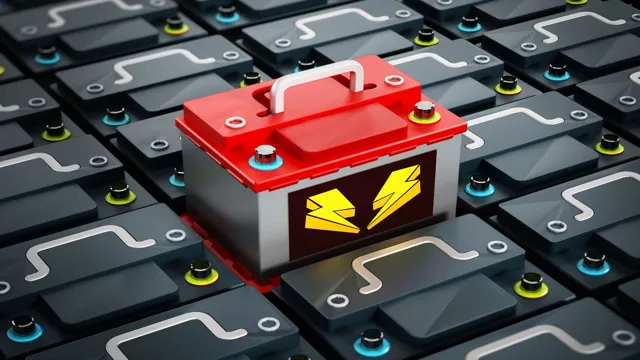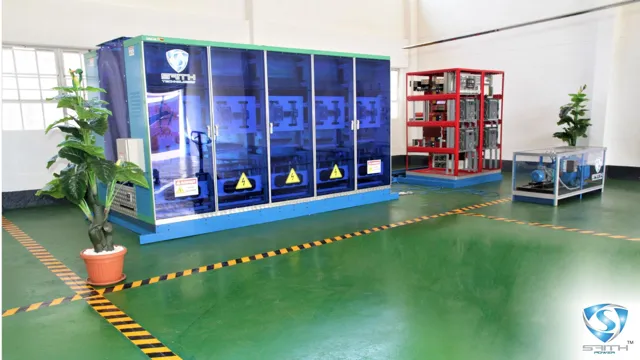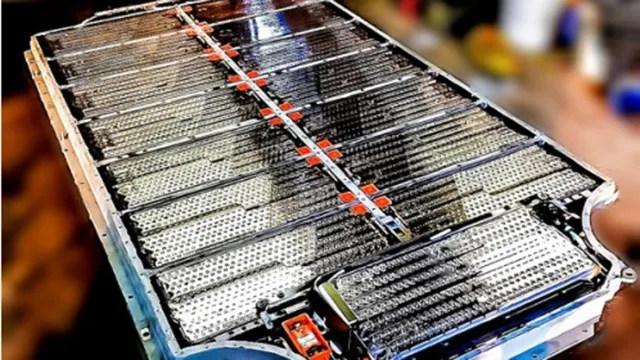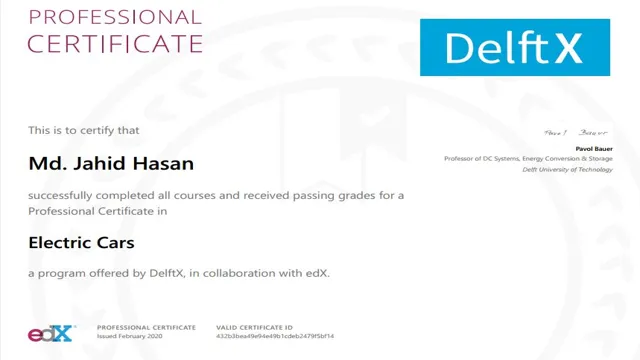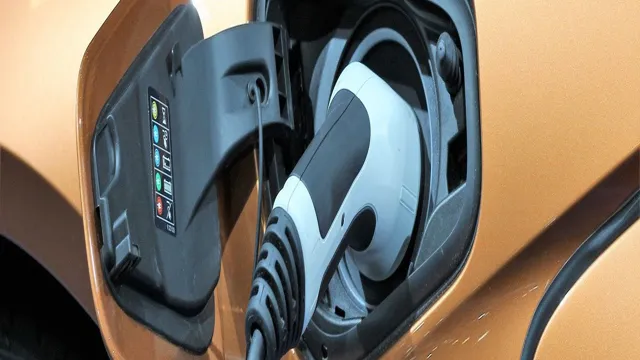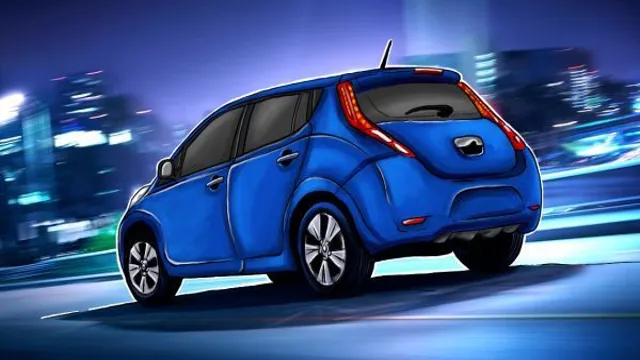Powering the Future: Exploring the Top Battery Technologies for Efficient Electric Cars
Electric cars have taken the automobile industry by storm, and their popularity is only increasing. One of the key elements of an electric vehicle is its battery, which is responsible for powering the entire vehicle. As such, the type of battery used in an electric car is crucial as it determines its range, charging time, and overall performance.
With so many battery technologies available, it can be challenging to determine the best option for electric cars. But fear not, in this blog post, we will explore the top battery technologies currently used in electric cars, their pros and cons, and which one stands out as the best. So, buckle up as we dive deep into the world of electric vehicle batteries to find out which one reigns supreme.
Lithium-Ion: The Most Common Battery Type
When it comes to the best battery technology for electric cars, the most common type is the lithium-ion battery. These batteries are preferred because they are energy-dense, which means they can store a lot of energy in a small space, making them ideal for electric vehicles where space is limited. Lithium-ion batteries are also lightweight, which is important for electric cars because they need to be as efficient as possible to maximize driving range.
Additionally, they have a low self-discharge rate, which means they can hold their charge for a long time without losing power. The technology behind these batteries is constantly evolving, with improvements in energy density and charging times being made all the time. So, while there may be other battery technologies available for electric cars, for now, lithium-ion remains the most practical and effective option.
Benefits of Lithium-Ion Batteries
Lithium-Ion: The Most Common Battery Type Lithium-ion batteries are by far the most common type of rechargeable batteries. They are present in everyday devices like smartphones, tablets, laptops, and power banks. The reason why they are so popular is their ability to store a large amount of energy in a relatively small size, which makes them more efficient and portable compared to other battery types.
These batteries also have a low self-discharge rate, which means that they retain their energy for a longer period than other types of batteries. Another benefit of Li-ion batteries is that they have a longer lifespan than other rechargeable batteries such as nickel-cadmium and nickel-metal hydride. This longer lifespan is due to the structure of the battery, as Lithium-ion batteries do not experience memory effect which allows them to retain their original maximum charge capacity despite repeated charges and discharges.
So whether you want to use them in your daily life devices or more sophisticated machines, Li-ion batteries offer a long-lasting and efficient source of energy that will keep up with your needs.
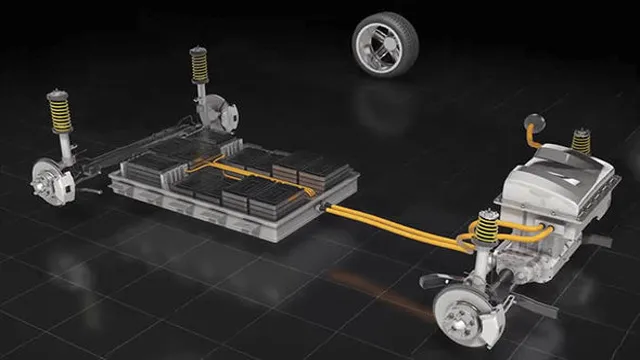
Drawbacks of Lithium-Ion Batteries
Lithium-Ion: The Most Common Battery Type Lithium-Ion batteries are the most common type of battery that powers our everyday electronic devices. They’re known for their high energy density, long lifespan, and lightweight design. However, there are also significant drawbacks to using lithium-ion batteries.
One major issue is their tendency to overheat and catch fire, which has led to safety concerns over the years. Additionally, they’re not environmentally friendly since they contain toxic chemicals and metals that pose a potential threat to the environment if not disposed of properly. Another drawback is that they have limited energy storage capacity, which means they may not be suitable for certain applications that require high power output for extended periods.
Although lithium-ion batteries have become the industry standard for most electronic devices, it’s important to consider their drawbacks and explore alternative battery technologies that are safer and more sustainable.
Solid-State Batteries: A Promising Alternative
When it comes to electric cars, it’s essential to have the best battery technology available. The battery plays a critical role in determining the car’s performance, range, and overall efficiency. Many researchers and scientists are working on developing new and improved battery technology.
One promising alternative to the current lithium-ion batteries is solid-state batteries. Solid-state batteries have many advantages over conventional lithium-ion batteries, including higher energy density, longer lifespan, and faster charging capabilities. Additionally, they are safer and more environmentally friendly as they do not contain any flammable liquids or toxic chemicals.
As the demand for electric cars increases, solid-state batteries could be the game-changer that makes them more affordable and practical for everyday use. With the best battery technology for electric cars, drivers could enjoy longer ranges and quicker charging times, making the switch to electric cars an easier and more enticing choice.
Advantages of Solid-State Batteries
Solid-state batteries represent a promising alternative to traditional lithium-ion batteries. What makes them so appealing? Well, for starters, they have the potential to be safer, more efficient, and longer-lasting than their counterparts. Unlike lithium-ion batteries, which rely on a liquid electrolyte to transport ions between electrodes, solid-state batteries use a solid electrolyte.
This means it’s less likely for them to catch fire or explode, as there’s no flammable liquid present. Additionally, solid-state batteries offer higher energy density, which means they can store more power in the same space. This property makes them ideal for use in small devices, such as wearables, smartphones, and drones.
While solid-state batteries are not yet widely available, they represent a promising direction for the future of battery technology.
Challenges of Solid-State Batteries
Solid-state batteries are a promising alternative to traditional lithium-ion batteries. They use a solid electrolyte instead of a liquid one, which makes them safer and more energy-dense. However, there are still some challenges that need to be overcome before they become widely available.
One of the main challenges is the cost. Solid-state batteries are still more expensive to produce than lithium-ion batteries. Another challenge is the difficulty of scaling up production.
Solid-state batteries are still in the research and development phase, so it may take some time before they can be mass-produced at an affordable price point. Additionally, there are still some issues with the performance of solid-state batteries in terms of their ability to charge and discharge quickly. Despite these challenges, solid-state batteries hold a lot of promise and could revolutionize the way we use energy in the future.
As we continue to develop new materials and technologies, we may be able to overcome these challenges and unlock the full potential of solid-state batteries.
Companies Using Solid-State Batteries in Electric Cars
Solid-State Batteries As electric cars become increasingly popular, there is a growing demand for batteries that offer higher performance and increased safety. That’s why many companies are turning to solid-state batteries as a promising alternative to traditional lithium-ion batteries. Solid-state batteries use a solid electrolyte instead of a liquid one, which means they are less prone to leakage, overheating, and other safety issues.
They also have a higher energy density, which means they can store more energy in a smaller space. So far, companies like Toyota, Volkswagen, and BMW have all announced plans to use solid-state batteries in their electric vehicles. While solid-state batteries are still in the development phase, they hold great potential to revolutionize the electric car industry by offering longer range, faster charging times, and increased safety.
Graphene Batteries: The Future?
When it comes to the best battery technology for electric cars, one particular innovation stands out: graphene batteries. Graphene, the one-atom-thick carbon compound, has been touted as a promising material for next-generation batteries due to its exceptional conductivity, mechanical strength, and chemical stability. Graphene batteries offer many advantages over conventional lithium-ion batteries, such as faster charging times, longer lifespan, higher energy density, and improved safety.
These batteries can also operate in extreme temperatures, making them ideal for electric vehicles that need to function in harsh climates. However, there are still a few challenges that need to be overcome before graphene batteries can become a viable commercial option, such as scalability, cost-effectiveness, and environmental impact. Nevertheless, the potential of graphene batteries as a game-changing technology in the electric vehicle industry remains high, and research and development efforts are ongoing to create a practical, mass-producible product.
As the demand for sustainable energy solutions continues to rise, it won’t be long until we see graphene batteries powering the future of transportation.
What Is Graphene?
As we dive into the world of advanced technology, it’s hard to ignore the evolutionary graphene batteries. Graphene is a material in which carbon atoms are arranged in a single layer of a hexagonal lattice, making it the lightest, thinnest, and strongest material on the planet. In short, this revolutionary material could drastically reduce the charging time, increase the battery’s lifespan, and make it more energy efficient.
As of now, it’s not too widely used in batteries, but scientists and researchers believe that it could very well be the key to the future of batteries. With its outstanding properties, graphene could potentially pave the way for the monstrous advancements in electric vehicles, smartphones, and other electronic devices. It’s not just us humans who will benefit from this technology; in fact, these batteries could help save the planet too by reducing harmful emissions from vehicles.
As we move towards a greener future, graphene batteries could serve as the backbone technology.
Advantages of Graphene Batteries
Graphene batteries are quickly emerging as a revolutionary technology that may change the future of battery-powered devices. Their advantages over traditional batteries come from the fact that graphene is an extremely strong and highly conductive material. One of the most significant benefits of graphene batteries is their energy density.
This means that they can hold more energy in a smaller and lighter package, resulting in longer battery life and reduced weight. Additionally, graphene batteries have quicker charging times, can operate in a wide range of temperatures, and have a longer overall lifespan. With these advantages, graphene batteries can potentially power everything from smartphones to electric cars and eventually replace traditional battery technology.
However, further research and development are still needed to make graphene batteries commercially viable on a large scale and cost-effective for consumers.
Conclusion: Which Battery Technology Is Right for You?
After exploring the many advancements and innovations in battery technology for electric cars, it’s clear that there’s still a lot of room for improvement. From longer range and faster charging times to reducing the environmental impact of the manufacturing process, the race to find the best battery technology for electric cars is far from over. But one thing is for certain – as electric cars become more popular and affordable, the demand for better battery technology will only continue to grow.
So whether it’s through continued research and development, or the discovery of new materials and processes, the future looks bright for the evolution of electric car batteries.”
FAQs
What is the most advanced battery technology for electric cars?
Currently, the most advanced and efficient battery technology for electric cars is lithium-ion.
How long does the battery of an electric car last?
The lifespan of an electric car battery depends on various factors, including usage patterns, temperature, and overall maintenance. Generally, a well-maintained battery can last up to 10 years or around 100,000 miles.
Can electric car batteries be recycled?
Yes, electric car batteries can be recycled. In fact, recycling batteries helps reduce waste and conserve valuable resources such as lithium, cobalt, and nickel.
Are there any upcoming battery technologies that could revolutionize electric cars?
Yes, several new battery technologies are currently under development, including solid-state batteries, flow batteries, and metal-air batteries. These technologies promise higher energy density and longer lifespan than current lithium-ion batteries. However, they are still in the early testing phase and may take several years to become widely available.

